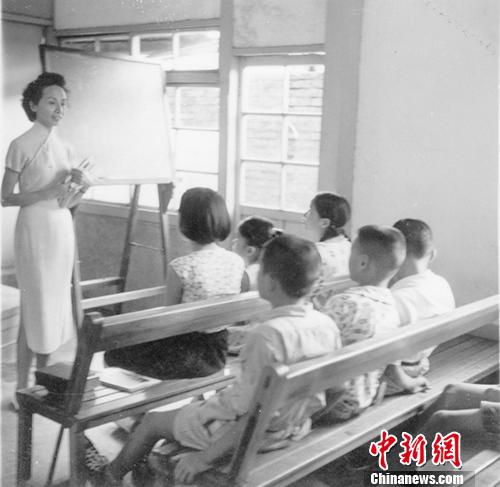Prof. Ye Jiaying's Life Quest

With her profound knowledge and vision of Chinese and Western cultures, Mrs. Ye has made remarkable achievements in the study and transmission of contemporary Chinese classical poetry. Her achievements have been widely reported in the media at home and abroad while many people know nothing about her ordeal.
In March 1948, Ye Jiaying married Mr. Zhao Zhongsun. Ye’s father was the chief of personnel at China Airlines. Mr. Zhao was a teacher at the Naval Academy of China. They both went to Taiwan in November of 1948. After arriving in Taiwan, she found a job as a teacher at National Changhua Girls' Senior High School. The following year, her first daughter was born. On the night before Christmas of 1949, Mr. Zhao went to visit his wife and daughter during the holidays from the Zuoying District. To everyone's surprise, early in the morning on December 25, a group of officers and soldiers came to them before dawn, searched their house, and took Mr. Zhao away, saying that he had “ideological problems”. Ye Jiaying took her daughter and followed them to the naval area of the battalion of Zuoying. After waiting for two days without any trace of information, they had to return to Changhua.

In 1950, when her daughter was still under one year old, a group of people from the Changhua Police Station took her to the police station along with the school principal and several other teachers, saying that they had ideological problems and asked them to write confessions. When the police wanted to send them to the military police headquarters in Taipei, holding her daughter in her arms, Ye approached the police chief of Changhua and said that she and her nursing child had no relatives or friends except her husband, who had been arrested, so what if something happened to them? If she had to be locked up, she should be locked up at the Changhua Police Station because her colleagues and students were in Changhua. They could be counted on if anything happened. Shortly afterward, the Changhua Police Station released Ye and her daughter. After leaving the police station, she was homeless and went to live with her husband's sister, who lived in Zuoying, so that she could figure out the whereabouts of Mr. Zhao in the meantime. The house of Mr. Zhao's sister was not spacious, with only two narrow bedrooms, one for his sister and brother-in-law, and one for his sister's mother-in-law, her granddaughter, and grandson. Ye had to wait until they all went to bed, then took a blanket and spread it in the hallway to sleep with her daughter.
In 1969, she was invited by the head of the East Asia Department at Harvard University, Mr. Hai Taowei, to teach at Harvard. But for various reasons, she ended up teaching at the University of British Columbia in Canada. At the beginning of her tenure, she was asked to teach not only doctoral students, but also an elective class on classical Chinese literature, which was to be taught in English. She had no choice but to agree. She was already 45 years old at that time. Every day until 2:00 AM she looked up vocabulary words with an English dictionary to prepare for her class. And the next morning she went to teach students. Her classes turned out to be very popular, and thus the number of students taking classical Chinese poetry at the university grew. In March of the following year, U.B.C. gave her a tenure-track appointment.
In the spring of 1976, she suffered an even greater blow. While on a trip, her eldest daughter, Yanyan, and her husband, Zong Yongting, passed away in a car accident. She locked herself up at home, avoiding all contact with friends, as any offer of care or sympathy would only add to her grief. She healed her pain with poetry and wrote ten poems called Poem Crying for My Daughter.
After this great shock, Mrs. Ye suddenly felt enlightened. She felt that basing everything on the ego should not be the ultimate pursuit, which gave her a broader vision - she decided to return to Chinese mainland to teach, and to pass on to the next generation precious things such as the heart, soul and will of the ancient poets.

Prof. Ye has devoted her whole life to classical Chinese poetry. After the demolition of her old house in Cha Yuan Hutong, Beijing, Nankai University became the only home she had in her homeland. She has mentioned many times that the warm reception she received from the teachers of Nankai University more than thirty years ago, from Mr. Li Jiye in particular, gave her a very affectionate feeling for Nankai, which has lasted until today.









